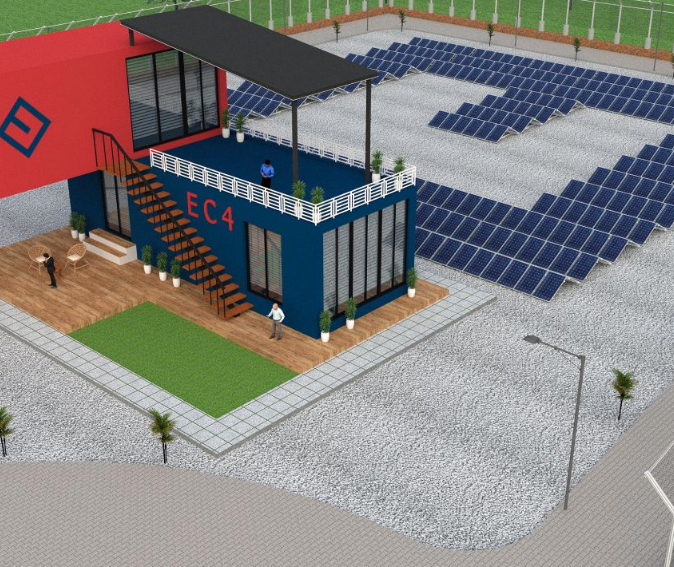Australia's Edge Centres had seemingly sprung up overnight when pv magazine first wrote about it in May. CEO Jonathan Eaves told pv magazine Australia this week that it plans to have its first Victorian off-grid data center up and running by November, fitted with 1 MW of solar and 48 hours of battery and UPS backup technology.
Edge Centres said on Monday that it has already secured development approval for the site, which will be in the central Victorian town of Bendigo, about 150 kilometers north of Melbourne.
In case you blinked and missed it, Edge Centres aims to roll out a string of grid-independent autonomous data centers across regional Australia, powered by ground-mounted and rooftop solar arrays, coupled with battery storage. It claims to be the world’s only off-grid edge data center operator, and its service is set to put regional Australia on a par with metro communications technology for the first time ever, in a carbon-negative manner.
Edge Centre’s facility in Bendigo, the EC3, will be 100% solar-powered and will be built on a site that was previously a car yard. Eaves said he is confident the center will be operational in just two months, as the solar array, which will be fully ground-mounted in this case, comes in what he calls “kit form,” just like the insulated center facility itself. This means that the only physical installation left is to lay a concrete slab and connect the solar.
“Everything else comes ready-made,” Eaves told pv magazine Australia.
The company said Bendigo is one of four additional Edge Centre facilities on track to begin operating in Australia this year, including another site in Victoria. So far, the company has four centers online, including a facility in the northern New South Wales town of Grafton, as well as three in Queensland, in the municipalities of Townsville, Cairns and Mackay.
The Grafton site which has been operational since April and is fitted with a 1 MW solar array, backed up by lithium-ion battery storage. But Eaves said the Queensland sites all still need to be retrofitted with solar, which is ultimately his plan.
In May, Edge Centres announced a partnership with Alan Kei Associates to launch its first data centers in Japan. Eaves said land for the Japanese facilities has been secured and solar installations will begin in October.
Transformative facilities
Popular content
In Australia, regional data processing still generally occurs in metropolitan-based centers, so it takes time and extra processing power to make the long return journey to more remote areas.
Eaves previously painted a sample picture for pv magazine, saying that data coming from a smart “agrotech” tractor working autonomously in regional New South Wales today would likely travel all the way to Sydney, where the data would be correlated and computed, before the outcome could get sent back.
“Processing at the edge reduces that time, but it also reduces the workload on the internet,” he says. Regional Australia also pays between two to three times as much for data and processing as city-dwellers, meaning their worse experience also has the double kick of costing more.
“Edge centers,” as the facilities themselves are also called, change that by setting up closer to the regional and rural populations they serve, delivering cloud computing resources and cached content to users more efficiently.
“Right now, Australia is on the cusp of an edge infrastructure wave, and Edge Centres is building ahead of this generational spike in demand for (Internet of Things), edge computing, and cloud. Building ahead of this wave means that we have time to build and connect the necessary infrastructure so that these regional hubs that haven’t been connected previously can be ready when it hits,” Eaves said.
He noted a handful of companies are now racing to provide these services to the previously forgotten regional populations of Australia.
Core aims
Eaves is no stranger to data center design and construction, having built facilities in Australia and the United Arab Emirates. His newly minted company is specifically targeting internet service providers, retail service providers, and managed service providers with services such as cloud connect, dark fiber, and IP transit. These are delivered through data centre designs that are minimally dependent on utility power and have a carbon-negative footprint, the company says. Its sites are “carrier-neutral,” it added, to encourage competition, enrich its ecosystem, and to drive down prices for the customer.
Over the next 18 months, Edge Centres plans to scale up its business across Victoria, New South Wales, Queensland and Japan. It hopes to reach 20 sites by the end of 2022.
This content is protected by copyright and may not be reused. If you want to cooperate with us and would like to reuse some of our content, please contact: editors@pv-magazine.com.



1 comment
By submitting this form you agree to pv magazine using your data for the purposes of publishing your comment.
Your personal data will only be disclosed or otherwise transmitted to third parties for the purposes of spam filtering or if this is necessary for technical maintenance of the website. Any other transfer to third parties will not take place unless this is justified on the basis of applicable data protection regulations or if pv magazine is legally obliged to do so.
You may revoke this consent at any time with effect for the future, in which case your personal data will be deleted immediately. Otherwise, your data will be deleted if pv magazine has processed your request or the purpose of data storage is fulfilled.
Further information on data privacy can be found in our Data Protection Policy.